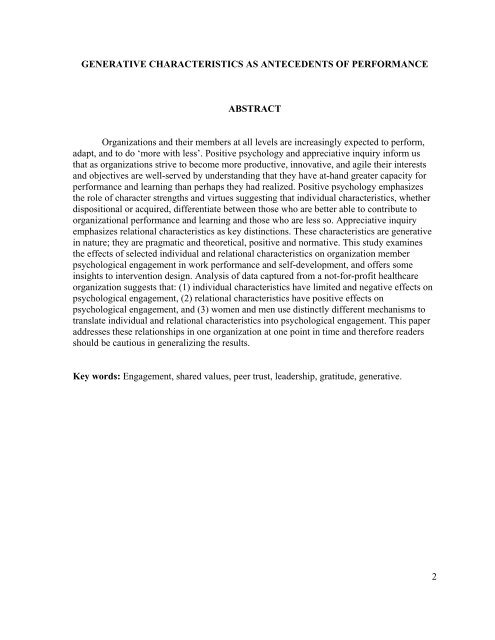GENERATIVE CHARACTERISTICS AS ANTECEDENTS OF ...
GENERATIVE CHARACTERISTICS AS ANTECEDENTS OF ...
GENERATIVE CHARACTERISTICS AS ANTECEDENTS OF ...
Create successful ePaper yourself
Turn your PDF publications into a flip-book with our unique Google optimized e-Paper software.
<strong>GENERATIVE</strong> <strong>CHARACTERISTICS</strong> <strong>AS</strong> <strong>ANTECEDENTS</strong> <strong>OF</strong> PERFORMANCE<br />
ABSTRACT<br />
Organizations and their members at all levels are increasingly expected to perform,<br />
adapt, and to do ‘more with less’. Positive psychology and appreciative inquiry inform us<br />
that as organizations strive to become more productive, innovative, and agile their interests<br />
and objectives are well-served by understanding that they have at-hand greater capacity for<br />
performance and learning than perhaps they had realized. Positive psychology emphasizes<br />
the role of character strengths and virtues suggesting that individual characteristics, whether<br />
dispositional or acquired, differentiate between those who are better able to contribute to<br />
organizational performance and learning and those who are less so. Appreciative inquiry<br />
emphasizes relational characteristics as key distinctions. These characteristics are generative<br />
in nature; they are pragmatic and theoretical, positive and normative. This study examines<br />
the effects of selected individual and relational characteristics on organization member<br />
psychological engagement in work performance and self-development, and offers some<br />
insights to intervention design. Analysis of data captured from a not-for-profit healthcare<br />
organization suggests that: (1) individual characteristics have limited and negative effects on<br />
psychological engagement, (2) relational characteristics have positive effects on<br />
psychological engagement, and (3) women and men use distinctly different mechanisms to<br />
translate individual and relational characteristics into psychological engagement. This paper<br />
addresses these relationships in one organization at one point in time and therefore readers<br />
should be cautious in generalizing the results.<br />
Key words: Engagement, shared values, peer trust, leadership, gratitude, generative.<br />
2
















